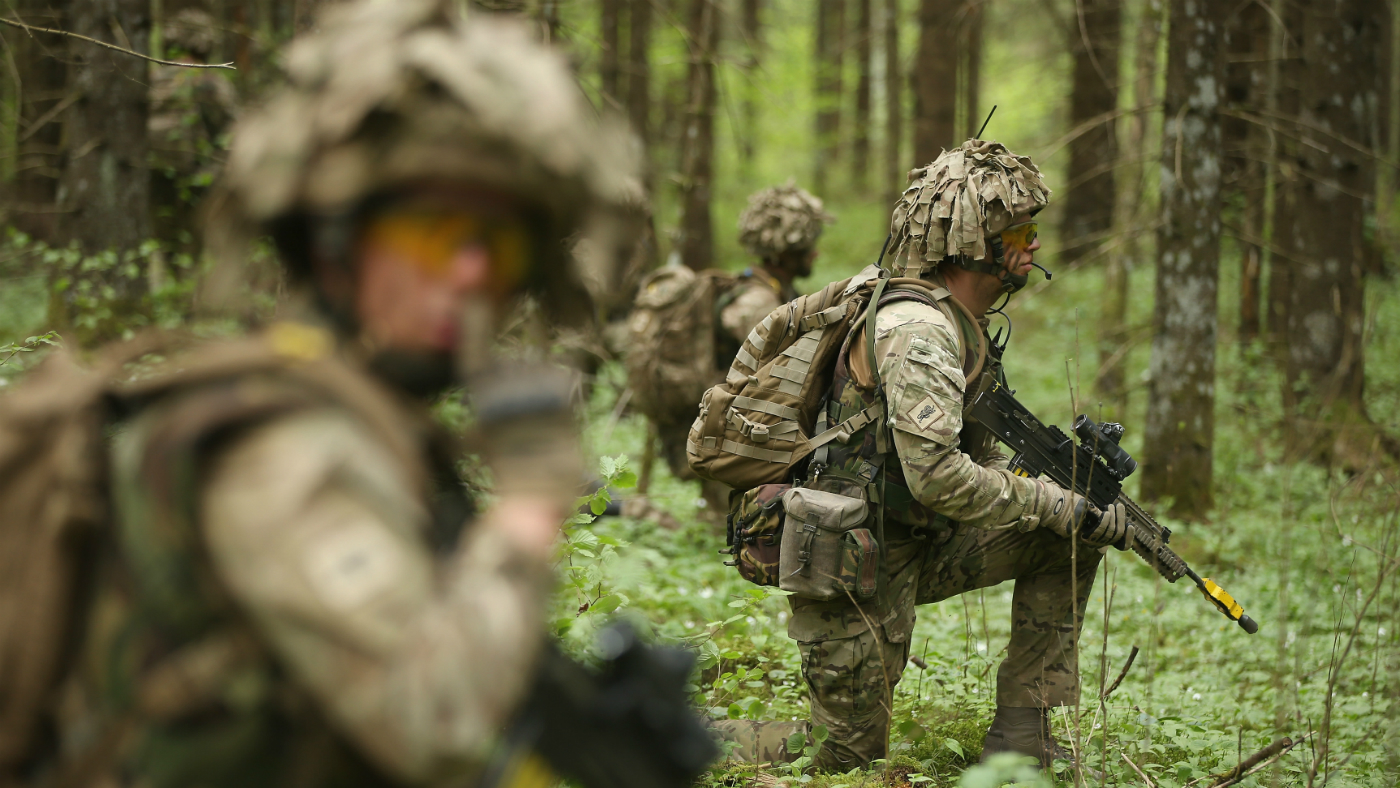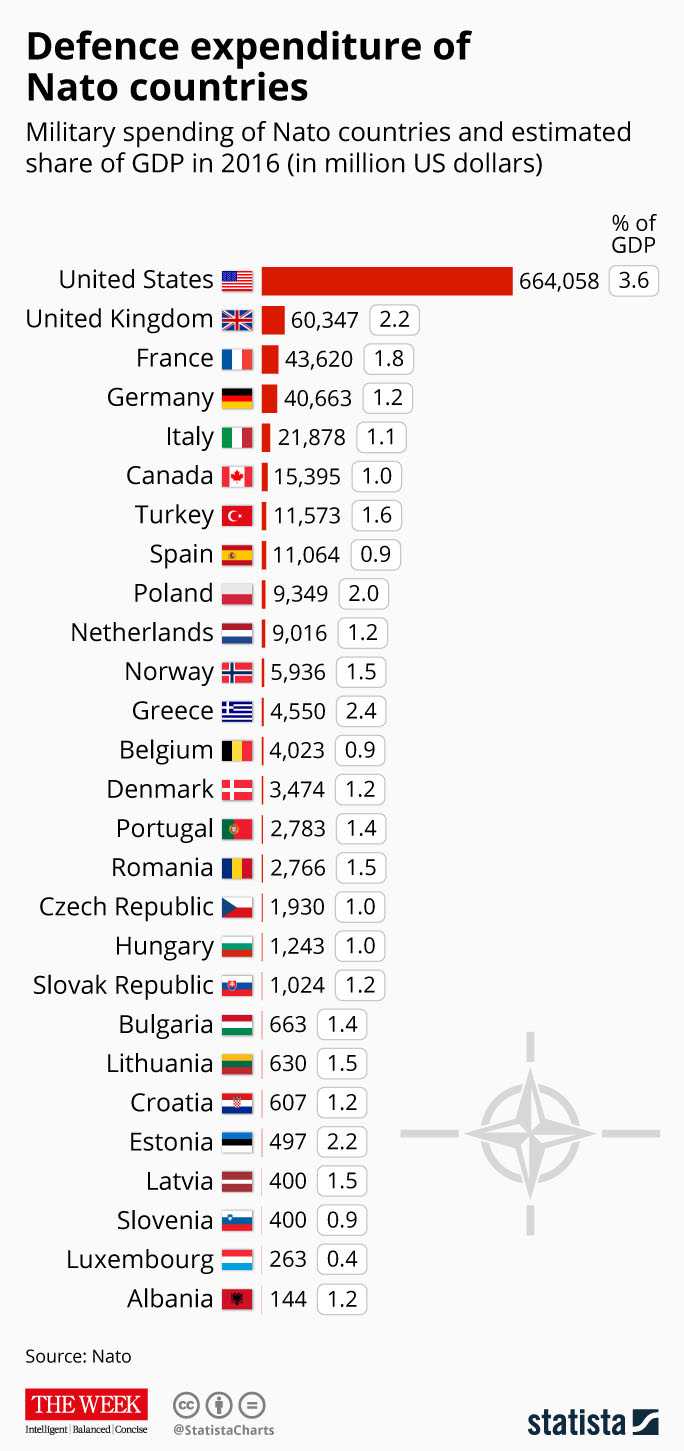Fact Check: The truth behind Nato military spending
Donald Trump says European members of the military alliance aren't paying their fair share – but is he right?

A free daily email with the biggest news stories of the day – and the best features from TheWeek.com
You are now subscribed
Your newsletter sign-up was successful
European members of Nato have long been accused of shirking their financial commitment to the military alliance, but what are the facts?
Who says what?
The latest debate on military spending comes ahead of the first face-to-face meeting between US President Donald Trump and German Chancellor Angela Merkel in Washington next week.
The Week
Escape your echo chamber. Get the facts behind the news, plus analysis from multiple perspectives.

Sign up for The Week's Free Newsletters
From our morning news briefing to a weekly Good News Newsletter, get the best of The Week delivered directly to your inbox.
From our morning news briefing to a weekly Good News Newsletter, get the best of The Week delivered directly to your inbox.
According to Ukip MEP Nigel Farage, frank discussions on defence spending will feature high on the agenda.
"Germany and, in fact, most of the EU members of Nato are not paying their way," he told Fox Business. "I think they are going to have some very harsh talks."
The Trump administration has repeatedly admonished its allies in Europe for failing to reach Nato spending targets, with Defence Secretary James Mattis last month warning member states to increase their defence budgets or risk seeing the US "moderate its commitment" to the alliance.
What are the facts?
A free daily email with the biggest news stories of the day – and the best features from TheWeek.com
The US spends more on its military than the rest of Nato combined, making up more than $664bn (£544bn) of a total expenditure of $918bn (£752bn) in 2016. The UK comes in second, followed by France, Germany and Italy.

US expenditure "effectively represents 73 per cent of the defence spending of the alliance as a whole", says Nato.
"This does not mean that the US covers 73 per cent of the costs involved in the operational running of Nato, but it does mean that there is an over-reliance by the alliance as a whole on the US for the provision of essential [military] capabilities."
Nato states have committed to spending two per cent of their GDP on defence by 2024, but only the US, Greece, Poland, Estonia and the UK have so far reached that target, according to the latest figures from the organisation.
However, there is disagreement over the exact amount spent by the UK last year, with one think-tank claiming the figure was actually 1.6 per cent, well below the threshold. The Ministry of Defence rejected the calculation, suggesting it may have been affected by exchange rate fluctuations.
Although European nations lag behind the US, which spends 3.3 per cent of its GDP on defence, military budgets are rising sharply across parts of the continent. Baltic states such as Latvia and Lithuania, alarmed by Russian military aggression, increased their defence budgets by 42 and 34 per cent respectively last year, according to CNN Money.
Germany, Europe's largest economy, also announced a significant boost in military spending this year; however, its contribution still falls far short of the target, remaining at a little more than one per cent of its GDP.
Who is right?
Farage and Trump are correct that the US shoulders the largest burden when it comes to relative military spending by Nato members. However, military budgets are growing across parts of the continent and member states have until 2024 to meet their spending obligations to the alliance. While they are still working to this timeframe, it is premature of the Trump administration to threaten action.
Infographic by www.statista.com for TheWeek.co.uk.
-
 The Olympic timekeepers keeping the Games on track
The Olympic timekeepers keeping the Games on trackUnder the Radar Swiss watchmaking giant Omega has been at the finish line of every Olympic Games for nearly 100 years
-
 Will increasing tensions with Iran boil over into war?
Will increasing tensions with Iran boil over into war?Today’s Big Question President Donald Trump has recently been threatening the country
-
 Corruption: The spy sheikh and the president
Corruption: The spy sheikh and the presidentFeature Trump is at the center of another scandal
-
 Epstein files topple law CEO, roil UK government
Epstein files topple law CEO, roil UK governmentSpeed Read Peter Mandelson, Britain’s former ambassador to the US, is caught up in the scandal
-
 Iran and US prepare to meet after skirmishes
Iran and US prepare to meet after skirmishesSpeed Read The incident comes amid heightened tensions in the Middle East
-
 Israel retrieves final hostage’s body from Gaza
Israel retrieves final hostage’s body from GazaSpeed Read The 24-year-old police officer was killed during the initial Hamas attack
-
 China’s Xi targets top general in growing purge
China’s Xi targets top general in growing purgeSpeed Read Zhang Youxia is being investigated over ‘grave violations’ of the law
-
 Panama and Canada are negotiating over a crucial copper mine
Panama and Canada are negotiating over a crucial copper mineIn the Spotlight Panama is set to make a final decision on the mine this summer
-
 Why Greenland’s natural resources are nearly impossible to mine
Why Greenland’s natural resources are nearly impossible to mineThe Explainer The country’s natural landscape makes the task extremely difficult
-
 Iran cuts internet as protests escalate
Iran cuts internet as protests escalateSpeed Reada Government buildings across the country have been set on fire
-
 US nabs ‘shadow’ tanker claimed by Russia
US nabs ‘shadow’ tanker claimed by RussiaSpeed Read The ship was one of two vessels seized by the US military